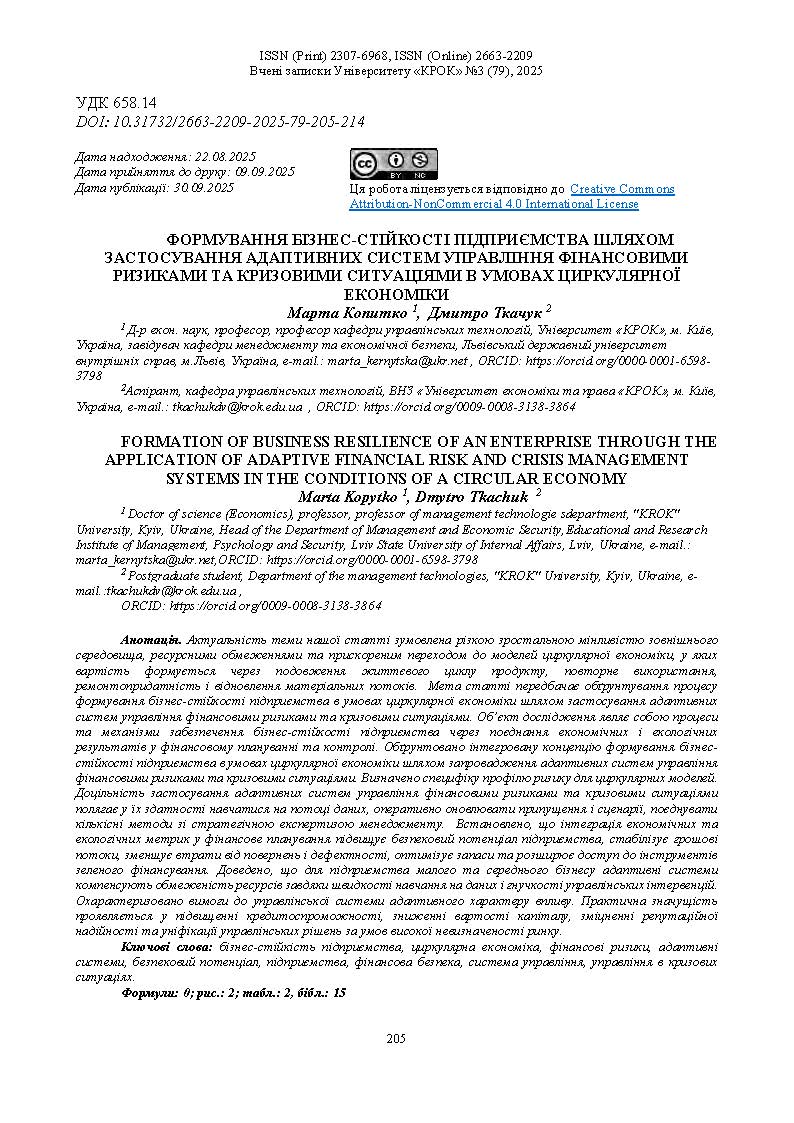ФОРМУВАННЯ БІЗНЕС-СТІЙКОСТІ ПІДПРИЄМСТВА ШЛЯХОМ ЗАСТОСУВАННЯ АДАПТИВНИХ СИСТЕМ УПРАВЛІННЯ ФІНАНСОВИМИ РИЗИКАМИ ТА КРИЗОВИМИ СИТУАЦІЯМИ В УМОВАХ ЦИРКУЛЯРНОЇ ЕКОНОМІКИ
DOI:
https://doi.org/10.31732/2663-2209-2025-79-205-214Ключові слова:
бізнес-стійкість підприємства, циркулярна економіка, фінансові ризики, адаптивні системи, безпековий потенціал, підприємства, фінансова безпека, система управління, управління в кризових ситуаціяхАнотація
Актуальність теми нашої статті зумовлена різкою зростальною мінливістю зовнішнього середовища, ресурсними обмеженнями та прискореним переходом до моделей циркулярної економіки, у яких вартість формується через подовження життєвого циклу продукту, повторне використання, ремонтопридатність і відновлення матеріальних потоків. Мета статті передбачає обґрунтування процесу формування бізнес-стійкості підприємства в умовах циркулярної економіки шляхом застосування адаптивних систем управління фінансовими ризиками та кризовими ситуаціями. Об’єкт дослідження являє собою процеси та механізми забезпечення бізнес-стійкості підприємства через поєднання економічних і екологічних результатів у фінансовому плануванні та контролі. Обґрунтовано інтегровану концепцію формування бізнес-стійкості підприємства в умовах циркулярної економіки шляхом запровадження адаптивних систем управління фінансовими ризиками та кризовими ситуаціями. Визначено специфіку профілю ризику для циркулярних моделей. Доцільність застосування адаптивних систем управління фінансовими ризиками та кризовими ситуаціями полягає у їх здатності навчатися на потоці даних, оперативно оновлювати припущення і сценарії, поєднувати кількісні методи зі стратегічною експертизою менеджменту. Встановлено, що інтеграція економічних та екологічних метрик у фінансове планування підвищує безпековий потенціал підприємства, стабілізує грошові потоки, зменшує втрати від повернень і дефектності, оптимізує запаси та розширює доступ до інструментів зеленого фінансування. Доведено, що для підприємства малого та середнього бізнесу адаптивні системи компенсують обмеженість ресурсів завдяки швидкості навчання на даних і гнучкості управлінських інтервенцій. Охарактеризовано вимоги до управлінської системи адаптивного характеру впливу. Практична значущість проявляється у підвищенні кредитоспроможності, зниженні вартості капіталу, зміцненні репутаційної надійності та уніфікації управлінських рішень за умов високої невизначеності ринку.
Завантаження
Посилання
Матвійчук А.В. Моделювання фінансової стійкості підприємств із застосуванням теорій нечіткої логіки, нейронних мереж і дискримінантного аналізу. Вісник НАН України, 2010, № 9.
Кириленко О., Малиняк Б., Письменний В., Русін В. Планування та управління фінансовими ресурсами територіальної громади. Київ : ТОВ «ПІДПРИЄМСТВО «ВІ ЕН ЕЙ», 2015. 396 с.
Ковтуненко Ю.В. Методичні основи аналізу фінансового стану промислового підприємства. Економіка. Фінанси. Право. 2016. № 8/2. С. 40–41.
Готра В.В., Ріпич В.В., Дячок А.В. Діагностика фінансового стану підприємства та шляхи його покращення. Економіка і суспільство. 2017. № 8. С. 219–223.
Денисенко М.П. Заходи покращення фінансового стану підприємства у сучасних умовах господарювання. Економіка і держава. 2019. № 12. С. 61–65.
Єлейко В., Боднар Р., Демчишин М. Економетричний аналіз діяльності підприємства. Тернопіль : Богдан, 2023. 368 с.
Майор О. Проблеми забезпечення фінансової стійкості підприємств. Науковий вісник. 2013. № 11.3. С. 130–133.
Гудзь Т. П. Місце фінансової рівноваги у понятійному апараті фінансів підприємств. Теорія і практика сучасної економіки : матеріали XVI Міжнародної науково-практичної конференції (м. Черкаси, 19 листопада 2015 р.). Черкаси : Черкаський державний технологічний університет, 2015. С. 85–87.
Крухмаль О. В. Оцінка фінансової стійкості як динамічної характеристики банку. Вісник УАБС. 2007. № 1 (22). С. 75–78.
Пігуль Н. Г., Хомутенко А. В. Теоретичні основи фінансової безпеки підприємства та механізму управління нею. Віник СумДУ. 2019. № 2. С. 80–87.
Чемчикаленко Р.А., Сукрушева Г.О., Ткаченко А.Ю. Теоретичні основи управління фінансовим станом підприємства. Інфраструктура ринку. 2019. Випуск 27. С. 350–354.
Сусіденко О. В. Фінансова безпека підприємства: теорія, методи, практика : монографія. Київ : ЦУЛ, 2015. 128 с
Штангрет А., Силкін О. Безпекові аспекти управління персоналом в умовах гіпердинамічного зовнішнього середовища. № 9(37), 2024. Наукові інновації та передові технології. С. 227-237.
Копитко М., Ткачук Д. Управління стійкістю і персоналом в організаціях та закладах охорони здоров’я у кризових ситуаціях: виклики в умовах війни. Вчені записки Університету «КРОК». 2024. No3 (75). С. 93-101.
Kopytko, M., & Sylkin, O. Modelling information support for combating corruption in the economic security management system of the state. Social and Legal Studios, 6(3), 2023, 60-66.

Downloads
Опубліковано
Як цитувати
Номер
Розділ
Ліцензія

Ця робота ліцензується відповідно до Creative Commons Attribution-NonCommercial 4.0 International License.

